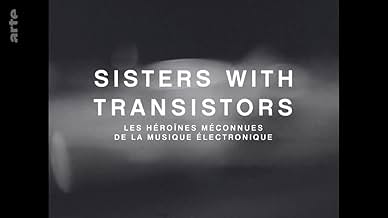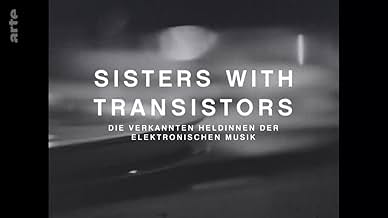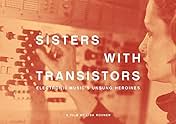Sisters with Transistors
- 2020
- Tous publics
- 1h 26min
NOTE IMDb
7,4/10
1,1 k
MA NOTE
Ajouter une intrigue dans votre langueFollows the story of electronic music's female pioneers, composers who embraced machines and their liberating technologies to utterly transform how we produce and listen to music today.Follows the story of electronic music's female pioneers, composers who embraced machines and their liberating technologies to utterly transform how we produce and listen to music today.Follows the story of electronic music's female pioneers, composers who embraced machines and their liberating technologies to utterly transform how we produce and listen to music today.
- Réalisation
- Scénario
- Casting principal
- Récompenses
- 2 victoires et 3 nominations au total
Jean-Michel Jarre
- Self
- (voix)
Kim Gordon
- Self
- (voix)
Brian Hodgson
- Self
- (voix)
Clara Rockmore
- Self
- (images d'archives)
Delia Derbyshire
- Self
- (images d'archives)
Daphne Oram
- Self
- (images d'archives)
Bebe Barron
- Self
- (images d'archives)
Barry Schrader
- Self
- (voix)
Sarah Davachi
- Self
- (voix)
Eliane Radigue
- Self
- (as Elaine Radigue)
Pierre Schaeffer
- Self
- (images d'archives)
Charles Amirkhanian
- Self
- (voix)
Ramon Sender
- Self
- (voix)
Barry Bermange
- Self
- (images d'archives)
- (voix)
Avis à la une
"Sisters With Transistors" (2020 release; 86 min.) is a documentary about the female pioneers of electronic music. As the movie opens, one of them comments that "technology is a tremendous liberator", allowing women to work on their own without depending on the approval or assistance of men (who dominate the industry). We then go back in time to the early 20th century and the origins of electronic music. At this point we are 10 min into the movie.
Couple of comments: this is the feature length debut of writer-producer-director Lisa Rovner. She digs deep into the origins of electronic music from the female perspective, and along the way profiles the key pioneers in this subgenre, including amont others Suzanne Ciani, Clara Rockmore, Delia Derbyshire, Pauline Oliveros, Wendy Carlos, and Laurie Spiegel. The movie does not go beyond the mid-70s, and hence no Laurie Anderson (who is the documentary's narrator). The documentary reminds us how incredibly controversial electronic music was. In fact, it wasn't referred to as "music" in the early days, but instead it was called things like "sonic propositions", and "electronic tonalities". Can you imagine that? The other thing that struck me while watching this, is how much archive footage the film makers were able to dig up on this, absolutely incredible. As a fan of electronic music going back to the early days of artists like Tangerine Dream and Klaus Schulze (yes, I know, all guys), I was more than delighted with the insights provided by this documentary.
"Sisters With Transistors" premiered at the 2020 SXSW festival to immediate acclaim. There is good reason why this documentary is rated 97% fresh on Rotten Tomatoes. It played very briefly here in Cincinnati at some point in 2021 and I kicked myself for having missed it. Thankfully, the documentary recently started streaming on Showtime On Demand and Showtime Anytime, where I caught it. If you have any interest in electronic music whatsoever, I'd readily suggest you check this out, and draw your own conclusion. I guarantee you won't be disappointed.
Couple of comments: this is the feature length debut of writer-producer-director Lisa Rovner. She digs deep into the origins of electronic music from the female perspective, and along the way profiles the key pioneers in this subgenre, including amont others Suzanne Ciani, Clara Rockmore, Delia Derbyshire, Pauline Oliveros, Wendy Carlos, and Laurie Spiegel. The movie does not go beyond the mid-70s, and hence no Laurie Anderson (who is the documentary's narrator). The documentary reminds us how incredibly controversial electronic music was. In fact, it wasn't referred to as "music" in the early days, but instead it was called things like "sonic propositions", and "electronic tonalities". Can you imagine that? The other thing that struck me while watching this, is how much archive footage the film makers were able to dig up on this, absolutely incredible. As a fan of electronic music going back to the early days of artists like Tangerine Dream and Klaus Schulze (yes, I know, all guys), I was more than delighted with the insights provided by this documentary.
"Sisters With Transistors" premiered at the 2020 SXSW festival to immediate acclaim. There is good reason why this documentary is rated 97% fresh on Rotten Tomatoes. It played very briefly here in Cincinnati at some point in 2021 and I kicked myself for having missed it. Thankfully, the documentary recently started streaming on Showtime On Demand and Showtime Anytime, where I caught it. If you have any interest in electronic music whatsoever, I'd readily suggest you check this out, and draw your own conclusion. I guarantee you won't be disappointed.
This is a well crafted documentary on the contributions of a handful notable women to early electronic music. Up through the 1960's, electronic music was effectively all experimental and this documentary focuses on this side of the medium. (So don't expect any dance music-what many people think of when they think of electronic music now days.) About the only complaint I would make about this film is something which is a common challenge for many creative works: I felt it started to lose momentum toward the end and dragged out a bit longer than it needed to.
Okay so before we start, can we agree that Sisters with Transistors is a wonderful title. "This is the story of women who hear music in their heads. Of radical sounds where there was once silence. Of dreams enabled by technology". If that doesn't whet your whistle I don't know what will. It's the story of early electronic pioneers, all women. Suzanne Ciani, Clara Lockmore, Delia Darbyshire, Daphne Oram, Eliane Radigue, Bebe Barron, Pauline Oliveros, Maryanne Amacher, Wendy Carlos, Laurie Spiegel. Electronic music is often thought of as a male domain, but this music and the ability to make it on your own, without the need of anyone else, including men set it perfectly for women to express themselves openly when other area of music and society were closed to them. Still, too many of these names are largely unknown. Sisters with Transistors sets out to change that. It's a deep dive into the origins of electronic music. Analogue machines, brought to life with patch wires, switches and flashing lights. The music is warm, open, energetic, unpredictable, but it's as much about women's struggle to be seen in the world as it is to harness their creative potential. It's 90 minutes are packed with fascinating archive footage, the only new elements are voice narration with everyone from Jean Michel Jarre and Holly Herndon to Kim Gordon. It's all very DIY. Delia will run you through the concept of waveforms and tape loops, foley, pitch shifting and how The Blitz influenced her ideas of abstract sound. It's quite incredible, from Oran's Drawn Sound to Radigue's feedback experiments. Spiegel's hole punched computer music and her invention of the first music software on the Apple Mac to Barron's score for Forbidden Planet being credited as 'Electronic Tonalities' instead of music, because the establishment was scared of what was happening and Darbyshire then blowing the doors off the whole damn thing with the Doctor Who theme. I don't like Doctor Who, but my god that score is spine-tingling. Can you imagine sitting in your living room in 1963 and that sound coming from the TV in the corner. There's only one word, Powerful. To which Thurston Moore can attest to with his fingers in his ears as Maryanne Amacher threatens to make them bleed. It's exciting stuff! The Beeb is a common thread that pops up in several of these stories, with the fabled Radiophonic Workshop, a throwback to when the BBC was much braver in its programming choices. But the main thread is these woman are confident. They are the experts in their field and they know it. There's no arrogance to them though, even in the face of the sometimes condescending men interviewing them. It does what any good documentary does in being informative, but it's a journey of these women's lives, of gender inequality, of their ingenuity. "How do you exercise the cannon of classical music of misogyny with two oscillators, a turntable and tape delay" and like any good doc, it's left me wanting to research further. Not least by finding a vinyl copy of Switched On Bach, which sounds like something I need to hear with a bit of authentic crackle. There's not a single mention of seeking commercial success, it's pure art, pure expression. Sit back and let these wonderful musicians transport you.
This is the story of early electronic music, experimental electronic music, women's role in electronic music, and in general, a story about how hard women had to work to get any recognition.
I know people are tired of social justice issues, but the marginalization of women is very real, been going on since the dawn of man, and is still present. So I think that message is on point.
But I want to talk about the electronic music. As a lifelong fan of electronics in music, and unique sounds, and non standard music, like Forbidden Planet, this documentary does a good job of trying to vocalize why people would be involved in this.
These women were rebels. They found electronic music liberating. Each of them went about things differently though. One woman created an electronic version of a piece of music that's been heard by millions of people, and is of course deeply associated with the sci fi show Doctor Who. One did installation art, where you had to be there, to understand what she was trying to do. One found a niche doing mainly commercials. One woman created the first electronic score for a motion picture. One worked with computers as a tool for creating electronic music. Etc.
I knew about some of these women, but not others. And hearing in their own words, their views on making electronic music, is of course very interesting.
Watch this with an open mind I guess, or if that's not possible, I guess don't watch it.
I know people are tired of social justice issues, but the marginalization of women is very real, been going on since the dawn of man, and is still present. So I think that message is on point.
But I want to talk about the electronic music. As a lifelong fan of electronics in music, and unique sounds, and non standard music, like Forbidden Planet, this documentary does a good job of trying to vocalize why people would be involved in this.
These women were rebels. They found electronic music liberating. Each of them went about things differently though. One woman created an electronic version of a piece of music that's been heard by millions of people, and is of course deeply associated with the sci fi show Doctor Who. One did installation art, where you had to be there, to understand what she was trying to do. One found a niche doing mainly commercials. One woman created the first electronic score for a motion picture. One worked with computers as a tool for creating electronic music. Etc.
I knew about some of these women, but not others. And hearing in their own words, their views on making electronic music, is of course very interesting.
Watch this with an open mind I guess, or if that's not possible, I guess don't watch it.
10jp7570
This film history was LONG overdue and tells the important story of the influential creators in electronic music.
It is true that Wendy Carlos has been one of the most recognized American forces in this genre. When Carlos' break-through popular LP "Switched-On Bach" was released in 1968, it was done so as "Walter Carlos". (Carlos would have gender reassignment surgery in 1972, changing her name to Wendy.) Why bring this up?
The film includes a clip from a French documentary that shows a crowd in the Sam Goody store in NYC in 1968 buying "Switched-On Bach", mentioning it's popularity exceeding even the Beatles. But the English subtitles in that French film refer to Carlos as her. That's correct today, but in 1968 Carlos's work was released under her birth name. How could the French documentary know what was to happen 4 years later? Obviously they didn't - the subtitles had to have been changed long after that documentary was shot. This film should have discretely noted the difference instead of rewriting history, no matter how well-intentioned it may have been. That would take absolutely nothing away from Carlos' talent, creativity and influence.
It is true that Wendy Carlos has been one of the most recognized American forces in this genre. When Carlos' break-through popular LP "Switched-On Bach" was released in 1968, it was done so as "Walter Carlos". (Carlos would have gender reassignment surgery in 1972, changing her name to Wendy.) Why bring this up?
The film includes a clip from a French documentary that shows a crowd in the Sam Goody store in NYC in 1968 buying "Switched-On Bach", mentioning it's popularity exceeding even the Beatles. But the English subtitles in that French film refer to Carlos as her. That's correct today, but in 1968 Carlos's work was released under her birth name. How could the French documentary know what was to happen 4 years later? Obviously they didn't - the subtitles had to have been changed long after that documentary was shot. This film should have discretely noted the difference instead of rewriting history, no matter how well-intentioned it may have been. That would take absolutely nothing away from Carlos' talent, creativity and influence.
Le saviez-vous
- Citations
Suzanne Ciani: I couldn't get a record deal, but advertisers wanted to be on the edge.
- Versions alternativesarte television aired a 53 minute version of this documentary.
- ConnexionsReferences Planète interdite (1956)
Meilleurs choix
Connectez-vous pour évaluer et suivre la liste de favoris afin de recevoir des recommandations personnalisées
- How long is Sisters with Transistors?Alimenté par Alexa
Détails
Box-office
- Budget
- 500 000 £GB (estimé)
- Montant brut mondial
- 5 241 $US
- Durée1 heure 26 minutes
- Couleur
- Rapport de forme
- 1.33 : 1
Contribuer à cette page
Suggérer une modification ou ajouter du contenu manquant

Lacune principale
By what name was Sisters with Transistors (2020) officially released in India in English?
Répondre
























